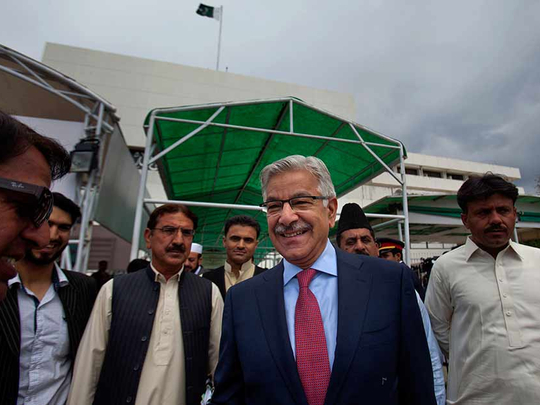
Manama: A Kuwaiti daily has come out with a stinging criticism of Pakistan, accusing its leaders of political blackmail and of failure to deliver on their pan-Islamic pledges, in an unprecedented attack.
“The Pakistani stance that was adopted through the parliament’s decision to remain neutral has dropped the blackmail masks about protecting sacred Islamic sites and sharing a common destiny with Muslim countries,” Ahmad Al Jarallah, the editor-in-chief of Al Seyassah daily, wrote in a front page editorial on Sunday.
“The slogans were merely political blackmailing tools and Pakistan thought it could use them to feed its crisis-hit economy. The Gulf countries were well aware since the beginning that the assistance it providing to Pakistan was merely to help quell the rampant extremism there and to help Islamabad overcome the poverty that has largely contributed to the emergence of terrorist groups that are a strategic threat to the Gulf and Islamic security,” Al Jarallah wrote.
The editor said that Pakistan had bowed to Iran amid concerns it would suffer a defeat at the hands of the Iranian religious leaders whom he accused of expertise in generating terrorist groups.
“There is no doubt that the Pakistani leadership has made a mistake by betting on Iran, and even its fear from Tehran is not grounded in reality since the Iranian claims about military and missile capabilities and the nuclear programme are not more than a game,” Al Jarallah said.
“The Gulf Cooperation Council (GCC) countries do not need Pakistan. In fact, Pakistan needs them in various areas. The GCC can defend its security, particularly following the alliance with other countries such as Jordan and Egypt. Pakistan needs to look carefully at the Iranian plots, especially its attempt to scare the world with its military capabilities.”
The Pakistani parliament last week voted not to take part in the Saudi Arabia-led military operation to defeat Al Houthi rebels and restore Yemen’s legitimate government.
Riyadh had reportedly wanted Islamabad to assist them with ground troops, fighter jets and naval ships.
Pakistani Prime Minister Nawaz Sharif, facing a major diplomatic challenge and torn between the wishes of traditional ally Saudi Arabia and neighbouring Iran that backs the Al Houthis in Yemen, opted to turn to parliament for a decision.
However, the lawmakers’ vote for non-participation in the military operations triggered anger and disappointment in the GCC.
On Friday, UAE Minister of State for Foreign Affairs Dr Anwar Mohammad Gargash said the Pakistani parliament’s rejection of intervention in Yemen was “unexpected.”
“The Pakistani parliament’s decision about neutrality in the Yemeni conflict but genuine support for Saudi Arabia is paradoxical and unexpected from Islamabad,” he posted on his Twitter account.
“The Arabian Gulf is now going through a critical and crucial confrontation and its strategic security is at stake. Such moments of truth characterise genuine allies and distinguish them from those who are limited to media and statements,” he said.
In another tweet, he said that Pakistan was required to adopt a clear stance in the interests of its strategic relations with the Arabian Gulf states.
“Contradictory and ambiguous attitudes in such crucial issues have a high cost,” he said.
Amid the mounting criticism, Pakistan is expected to launch a damage-control campaign.
According to Pakistani daily The News, Islamabad will likely send a high-level delegation headed by Sartaj Aziz, Adviser to the Prime Minister on Foreign Affairs and National Security, to Saudi Arabia soon with a special message from Prime Minister Nawaz Sharif to the Saudi leadership. The decision is expected to be announced on Monday.











